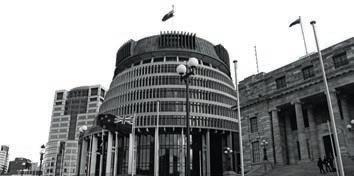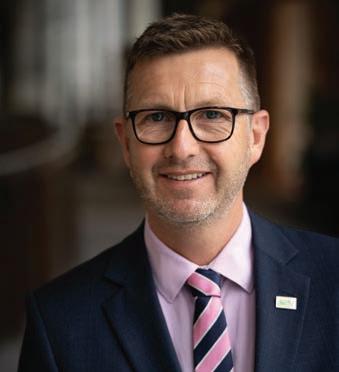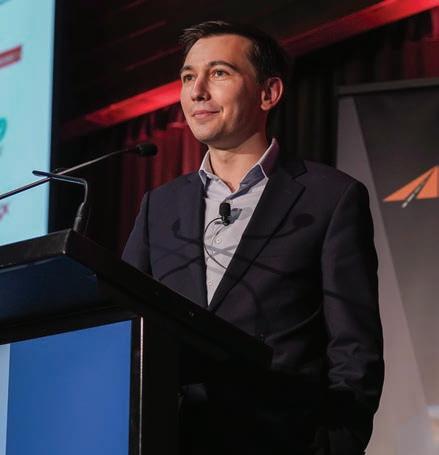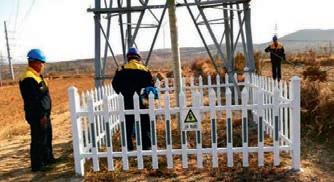
8 minute read
It’s Political
WHAT THE POLITICIANS THINK ABOUT TRUCKING
THE NEW ZEALAND TRUCKING INDUSTRY FACES
many challenges – many of them influenced by Government policy.
Apart from the many problems currently created by the COVID-19 pandemic, there’s the ongoing driver shortage, the worsening state of the nation’s roading network and looming emissions reduction legislation…
So, who among our political parties offers any salvation for the industry in these situations?
To have some insight into what politicians are thinking about issues impacting the road transport industry, NZ Truck & Driver has offered each of the major political parties the opportunity to voice their views on trucking matters each month.
This month the National and ACT parties offer their views on the transport industry. T&D
DRIVER SHORTAGES MUST BE ADDRESSED

By Simon Court, ACT Party spokesperson on transport
FULL RUBBISH BAGS AND WHEELIE
bins lined my street when I returned to West Auckland in late October after a week in Parliament. I was trying to remember if Monday had been another surprise public holiday which would have delayed collection by a day, but no.
The following day the bins and bags were still there. It was early Saturday evening when I heard the comforting sound of a rubbish truck lifting bins, averting a potential public health emergency.
According to the Waste Management Industry Forum, we should prepare for more late collections – there is a shortfall of 400 drivers for waste collection vehicles.
The forum, along with the Bus and Coach Association and National Road Carriers wrote to Immigration Minister Michael Wood asking that drivers be added to the green list of skilled workers who can help fill shortages.
The letter stated: “The sectors we represent are facing a shortfall of over 9,000 drivers. At least 8,000 for freight vehicles of all sizes and classes; up to 600 bus drivers; and around 400 drivers of waste collection vehicles.”
They go on in their letter to say: “We cannot overstate the degree of strain this is placing on the businesses we represent. It is resulting in unsustainable increases in cost, uncertainty and stress, and businesses are being stretched to breaking point in order to uphold commitments to clients and customers, and to the New Zealand public. We are receiving reports of burnout on an unprecedented scale.”
If the shortages aren’t addressed, the country was likely to experience a “significant and sustained decline in economic activity and in living standards”, they said.
“Increasingly, it will become impossible for businesses to get goods and services to and from market in the way that, until recently, they have been able to. Public transport and waste collection services, which are taken for granted in a modern, developed economy like New Zealand, will inevitably be pared back.”
The transport operators agreed that developing the local workforce is part of the solution, but that takes years to produce qualified drivers based on current licensing requirements. And at the current development rate there will not be enough trained to fill the gap.
The request made by these groups was simple. Sort out the immigration settings so workers can actually get into the country. Drivers provide an essential service to New Zealand and are working massive and unsustainable hours to keep things going.
Instead of taking the request seriously, Immigration and Transport Minister Wood responded with a political retort, blaming the industry for not providing good enough working conditions.
The Government loves a scapegoat for the labour shortages caused by its immigration policy. The go-to response is usually to blame the industry for the shortages it is experiencing.
The barriers to recruiting staff from overseas are not the wages – truck drivers are typically paid well over the median wage, and much more to drive the bigger rigs.
The problem remains stifling red tape and anti-immigration ideology from the Labour government. The steps that have to be completed to employ from overseas might have made sense when we didn’t have enough jobs to go around, but when employers are begging for workers, they are ridiculous.
The months it takes to work through each stage are incredibly stressful for transport operators already under pressure.
ACT would let skilled workers like heavy truck drivers come into the country to help solve the chronic labour shortage, while the industry works on local driver training.
Immigration policy should be simple to navigate and welcoming so that the New Zealand economy can grow. Once we have achieved that then more locals can be employed through job creation and investment. T&D
Simon Court
It’s political... GOVT TO SLASH STATE HIGHWAY SPEED LIMITS


By Simeon Brown, National Party Spokesman for Transport and Public Service.
Simeon Brown
THE LABOUR GOVERNMENT WANTS TO SLOW KIWIS DOWN AND IS planning to slash speed limits on State Highways across New Zealand.
Maps provided to me through written questions have revealed that the Government has marked almost the entire state highway network in red as not having a ‘safe and appropriate speed’. This is bad news for most Kiwis who use our state highways because the speed limits are potentially going to be slashed under Labour’s grand plans to slow New Zealanders down.
We have already seen this approach with the lowering of the speed limit from 100km/h to 80km/h on SH5 between Napier and Taupo, despite strong opposition from the community.
There is even a goal in the Government’s budget to reduce the speed limits on the state highway network by 500km or more every year.
Labour needs to be upfront with Kiwis about what their intentions are for each of our State Highway speed limits.
Getting around New Zealand in a safe and efficient way is critically important to all New Zealanders, and in particular our rural communities and truckies who transport freight around New Zealand.
Blanket speed limits will simply mean it will take longer to get around New Zealand, make our rural communities more isolated, and will do nothing to address the poor state of our State Highways which have become peppered with potholes.
Many of the green areas on the maps that are considered safe are the highways which National upgraded or built under the Roads of National Significance programme, such as the Waikato Expressway and Transmission Gully. But instead of continuing with this important programme of upgrading state highways to four lanes like Whangarei to Port Marsden and Cambridge to Piarere, Labour scrapped these projects.
Slashing speed limits across the board is a short-sighted, quickfix attempt to address the problem of road safety which is overly simplistic and doesn’t deal with the underlying issues.
Kiwis need a Government which will invest in our highways, not simply reduce on the speed limit on roads across New Zealand.
National opposes blanket speed limit reductions. The Government’s priority should be to maintain our highways to a safe standard and to ensure that the road rules are being appropriately enforced. T&D
State Highway Posted Speed Limits Compared to Safe and Appropriate Speeds (North Island)
No data for Auckland Region
Legend
Category
State Highway Posted Speed Limits Compared to Safe and Appropriate Speeds (South Island)
Legend
CASTROL’S NEW SUSTAINABILITY STRATEGY

CARBON NEUTRAL PROJECTS To help fulfil its carbon neutral programme, Castrol works with bp Target Neutral who purchase carbon carbon credits that support a portfolio of carbon reduction, avoidance, and removal projects around the world. These include support for projects such as the Zhaoyuan Zhangxing wind energy scheme in China, which mitigates more than 180,000 tonnes of carbon dioxide are each year by replacing fossil fuel power. Another such project has supported investment in solar energy in India, through a large-scale project that helps provide reliable and cost-effective off-grid electricity for families and business. To date, 60,000 solar units have been distributed. BUILDING ON ACHIEVEMENTS Castrol’s Senior Vice President, Mandhir Singh, said: “PATH360
builds upon work we’ve been doing for years, pulling it all together into one integrated sustainability programme. We know that many of our customers are looking for more sustainable offers and help with their sustainability goals, and this is what this programme is designed to deliver.”
Castrol is helping to drive a more sustainable future with its recently announced PATH360 strategy
The strategy sets out aims for 2030 to save waste, reduce carbon and improve lives, not just in Australia and New Zealand, but on a global basis. Castrol became Australia’s pioneer in carbon neutral lubricants in 2016, when the premium Castrol VECTON range of diesel engine oils became the first to be certified as carbon neutral. In 2021, all Castrol products we sell in Australia and New Zealand will be committed to carbon neutrality in accordance with PAS 2060. CASTROL’S 120 YEAR FIGHT AGAINST FRICTION, CORROSION AND WEAR Close to a quarter of the world’s energy is believed to be lost to friction, corrosion, and wear as per study by Kenneth Holmberg and Ali Erdemir.
“From Castrol’s earliest days, we have delivered products that help save energy by fighting exactly these
problems,” says Jotika Prasad, Castrol Marketing Director, Australia and New Zealand. Castrol is also supporting new and growing sectors, like renewable energy and e-mobility with products and services. For example, Castrol is the first lubricant supplier in the world to offer PAS 2060-certified carbon neutral lubricants for the wind turbine industry. REDUCING PRODUCT LIFE-CYCLE CARBON EMISSIONS As well as significantly increasing its carbon neutral offers to Australian customers, Castrol is aiming to halve its own global use of virgin plastic packaging from its 2019 baseline. The PATH360 strategy is based on circular thinking, which means the company is looking at the life-cycle of its existing and new products, to see how they can be improved, extended, reused, or recycled.
said Jane Carland, General Manager Castrol Australia and New Zealand, “and we plan
to be an important partner in helping them achieve their goals and our target is to halve the net carbon intensity of our products by 2030.”
For example, three of Castrol’s plants globally moved to renewable electricity in 2020. At the same time, the company has developed new light-weight bottle designs which use less plastic, saving on a global basis 7,000 tonnes per year by 2023.











